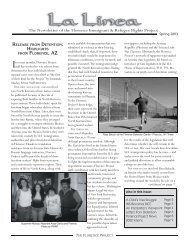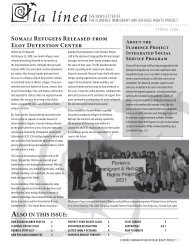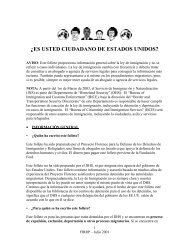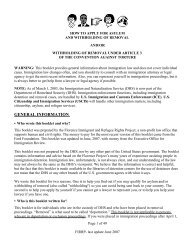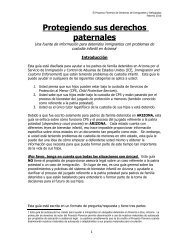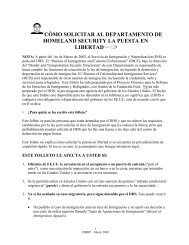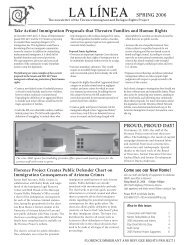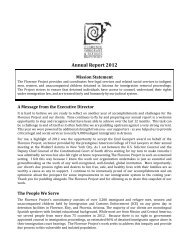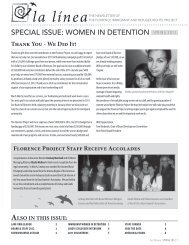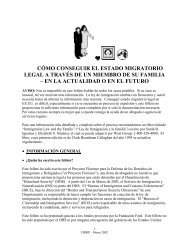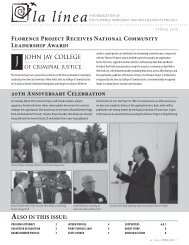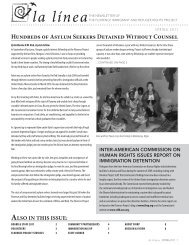quick reference chart and annotations for determining immigration ...
quick reference chart and annotations for determining immigration ...
quick reference chart and annotations for determining immigration ...
Create successful ePaper yourself
Turn your PDF publications into a flip-book with our unique Google optimized e-Paper software.
Immigrant Legal Resource Center, Florence Immigrant <strong>and</strong> Refugee Rights Project,<br />
Maricopa County Public Defender August 2012<br />
Matter of Balao, 20 I&N Dec. 440 (BIA 1992). ARS § 13-1807 requires merely that the person act<br />
“knowing that the person does not have sufficient funds.” While Arizona courts have not spoken on the<br />
issue of whether proof of fraudulent intent is necessary to sustain a conviction, it appears that it is not.<br />
For example, a person could be found guilty who wrote a non-postdated bad check but intended to place<br />
sufficient money in the account by the time the check cleared. However, if the record of conviction<br />
established fraudulent intent, it is possible that a court would consider that as an element of the offense,<br />
so counsel should keep the record clear of this.<br />
Aggravated Felony as Fraud or Deceit: Possibly divisible. If §13-1807 is considered to have<br />
fraud or deceit as an element, it will be an aggravated felony regardless of the sentence imposed if the<br />
“loss to the victim or victims exceeds $10,000.” 8 USC § 1101(a)(43)(M) <strong>and</strong> (U). This is true<br />
regardless of whether the amount of loss appears in the record of conviction. See Nijhawan v. Holder,<br />
129 S. Ct. 2294 (2009). ARS § 13-1807 requires that the defendant pass a check “knowing” that he lacks<br />
sufficient funds. Again, <strong>immigration</strong> counsel will point out that intent to deceive is not an element, <strong>and</strong><br />
the statute could be violated by a person who intended to place funds in the account immediately.<br />
However, a more secure plea can be obtained based on the difference between a crime of deceit <strong>and</strong> the<br />
crime of theft, which is a taking without consent. See Matter of Garcia-Madruga, 24I&N Dec. 436 (BIA<br />
2008). As long as a sentence of a year or more will not be imposed, where there is a loss exceeding<br />
$10,000 a more secure plea would be to a straight theft offense. (While a sentence of a year or more will<br />
make a conviction of theft an aggravated felony, the fact that the loss to the victim/s exceeded $10,000<br />
will not.) A plea to ARS § 13-1802 should avoid an aggravated felony even with a showing of a loss to<br />
the victim/s of over $10,000, as long as the record does not describe fraud or deceit <strong>and</strong> section A3 (theft<br />
by material misrepresentation) is not specifically designated. Regarding proof of $10,000 loss, see Note:<br />
Fraud.<br />
46 Theft of means of transportation, ARS §13-1814<br />
A. A person commits theft of means of transportation if, without lawful authority, the person knowingly<br />
does one of the following:<br />
1. Controls another person's means of transportation with the intent to permanently deprive the person of<br />
the means of transportation.<br />
2. Converts <strong>for</strong> an unauthorized term or use another person's means of transportation that is entrusted to<br />
or placed in the defendant's possession <strong>for</strong> a limited, authorized term or use.<br />
3. Obtains another person's means of transportation by means of any material misrepresentation with<br />
intent to permanently deprive the person of the means of transportation.<br />
4. Comes into control of another person's means of transportation that is lost or misdelivered under<br />
circumstances providing means of inquiry as to the true owner <strong>and</strong> appropriates the means of<br />
transportation to the person's own or another's use without reasonable ef<strong>for</strong>ts to notify the true owner.<br />
5. Controls another person's means of transportation knowing or having reason to know that the property<br />
is stolen.<br />
Summary: The statute is divisible; plead to the statute as a whole or to A2 or A4.<br />
Aggravated Felony. Maybe. Avoid an aggravated felony by avoiding a sentence imposed of a<br />
year or more. Even if a sentence of a year or more is imposed, a conviction under ARS §13-1804 does<br />
not constitute an aggravated felony if the record of conviction does not eliminate the possibility that the<br />
conviction was <strong>for</strong> A2 or A4, with no indication of an intent to deprive the owner. In Nevarez-Martinez<br />
v. INS, 326 F.3d 1053 (9th Cir. 2003) the Court found that § 13-1814 is divisible because sections A2, A4<br />
Arizona Criminal Chart with Explanatory Endnote – August 2012<br />
61



